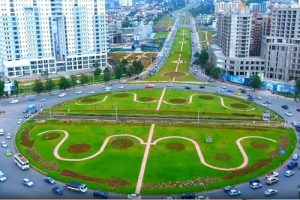
The Ethio-Djibouti Railway Transport Joint Stock Company, a major player in the transportation industry, has recently reported impressive financial results. Over the course of the last seven months of the fiscal year, the company has managed to earn an astounding 2.2 billion Birr. This noteworthy achievement can be attributed to the successful transportation of 1.2 million tons of incoming and outgoing cargo, as well as the safe and efficient travel of more than 115,000 passengers.
Fiseha Mebrahtom, the Company’s senior director of planning and program management, shared these remarkable figures with the Ethiopian Press Agency. He revealed that the company had surpassed their initial target, aiming to earn more than 2.158 billion Birr during the same period. However, the company managed to achieve an impressive 104 % of the set target, resulting in the generation of over 2,256, 459, 000 Birr.
Fiseha further explained that the transportation of cargo played a significant role in the company’s financial success. Although their plan was to transport 1.5 million tons of cargo in the last seven months, they were able to move 1.2 million tons. However, he acknowledged that certain challenges, such as security and safety concerns, as well as delays in container loading, had affected the company’s performance.
The Ethio-Djibouti train transport handles various types of cargo, including containers, empty containers, soil fertilizers, vehicles, wheat, and cooking oil. By providing efficient services and reducing freight costs, the company has become a reliable partner for various institutions. Furthermore, the railway line connecting Ethiopia and Djibouti has made a significant contribution to the growth of the transport sector by facilitating the transportation of goods from the port to the country’s interior.
The company operates in several important railway stations, including Dire Dawa, Mojo, Adama, Lebu, Endode, Meiso, and Dewele.
Fiseha highlighted that the railway line currently serves 20 stations, and there are plans to open additional service stations in the near future. However, Fiseha also acknowledged that the company faces certain challenges. Among these challenges are the theft of railway infrastructure, interruptions and fluctuations in electricity supply, security concerns, and a shortage of foreign currency. These issues pose significant hurdles that the company strives to overcome in order to maintain and improve its performance.
According to the report the ability to transport a large amount of cargo and passengers has contributed to this achievement. although the company faces challenges such as theft, electricity problems, security concerns, and foreign currency shortages, it remains committed to providing efficient services and expanding its operations to provide better service to the transportation needs of Ethiopia and Djibouti.
The Ethiopia-Djibouti Railway, also known as the Addis Ababa-Djibouti Railway, has emerged as a significant infrastructural project in East Africa, holding immense promise for interconnecting ports with hinterlands. This railway system, spanning approximately 750 kilometers, serves as a vital trade corridor between landlocked Ethiopia and the Port of Djibouti, providing a reliable and efficient transportation link for goods and people. The completion of this ambitious project has opened up new opportunities for economic growth, regional integration, and enhanced connectivity in the region.
The Ethiopia-Djibouti Railway has a rich historical background that dates back to the late 19th century. The original railway line was constructed between 1894 and 1917 during the colonial era, connecting the Ethiopian capital, Addis Ababa, with the Port of Djibouti. However, due to years of neglect and disrepair, the railway fell into a state of disuse, severely hampering Ethiopia’s import and export capabilities.
Recognizing the importance of a functional railway system for its economic development, Ethiopia embarked on an ambitious project to revitalize and upgrade the Ethiopia-Djibouti Railway. In partnership with China, the governments of Ethiopia and Djibouti invested heavily in constructing modernized and electrified railway infrastructure to standardize its operational efficiency. It is owned by the governments of Ethiopia (75% share) and Djibouti (25% share).
The new standard gauge railway, completed in 2017, replaced the old narrow gauge line, significantly increasing capacity and reducing travel time between the two countries. The upgraded railway boasts a maximum speed of 120 kilometers per hour, facilitating faster and more reliable transportation of goods and passengers.
The Ethiopia-Djibouti Railway has had a transformative impact on the economies of both Ethiopia and Djibouti. For Ethiopia, which heavily relies on Djibouti’s port for international trade, the railway provides a lifeline by offering a cost-effective and efficient transportation route. It has helped to alleviate congestion at the port and reduce logistics costs, making Ethiopian goods more competitive in global markets.
Moreover, the railway has opened up new opportunities for foreign direct investment, attracting companies interested in leveraging Ethiopia’s vast market potential. Access to reliable transportation infrastructure has made Ethiopia an attractive destination for industries seeking to establish manufacturing and distribution hubs in the region.
Beyond its national significance, the Ethiopia-Djibouti Railway plays a pivotal role in promoting regional integration and connectivity within East Africa. The railway is part of the larger vision to create a regional network of railways that will connect landlocked countries, such as South Sudan and Uganda, to the ports in Djibouti and Kenya.
This interconnected railway network will enhance trade flows, facilitate cross-border movement of goods and people, and foster closer economic cooperation among East African countries. It will also contribute to the realization of the African Union’s Agenda 2063, which aims to promote continental integration and boost intra-African trade.
The Ethiopia-Djibouti Railway has laid the foundation for further infrastructural development and economic growth in the region. Efforts are underway to extend the railway to other neighboring countries, including South Sudan and Uganda, which will further enhance regional connectivity and open up new trade corridors.
Additionally, plans are in place to establish industrial zones along the railway line, attracting investments and creating employment opportunities. Such initiatives will not only spur economic development but also contribute to poverty alleviation and human capital development in the region.
The Ethiopia-Djibouti Railway stands as a testament to the transformative power of infrastructure in driving economic growth and regional integration. By interconnecting ports with hinterlands, this railway has revolutionized trade and transportation in East Africa, offering new avenues for economic development and prosperity.
As the railway continues to expand and integrate with other regional networks, it holds the potential to unlock vast opportunities for trade, investment, and improved livelihoods. The Ethiopia-Djibouti Railway has become a symbol of hope, progress, and brighter prospects for the region as it moves towards a more interconnected and prosperous future.
BY LAKACHEW ATINAFU
THE ETHIOPIAN HERALD SUNDAY EDITION 3 MARCH 2024





